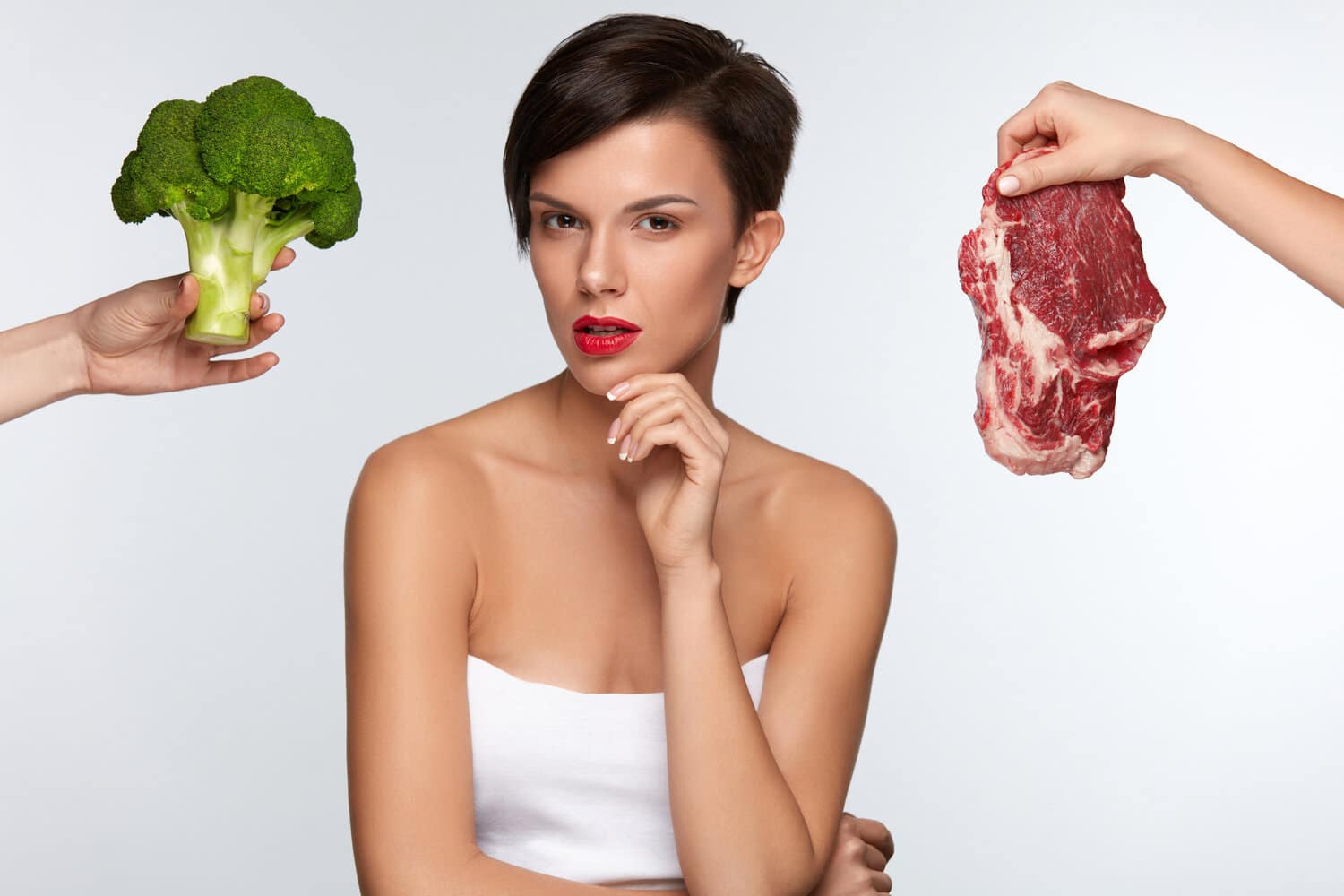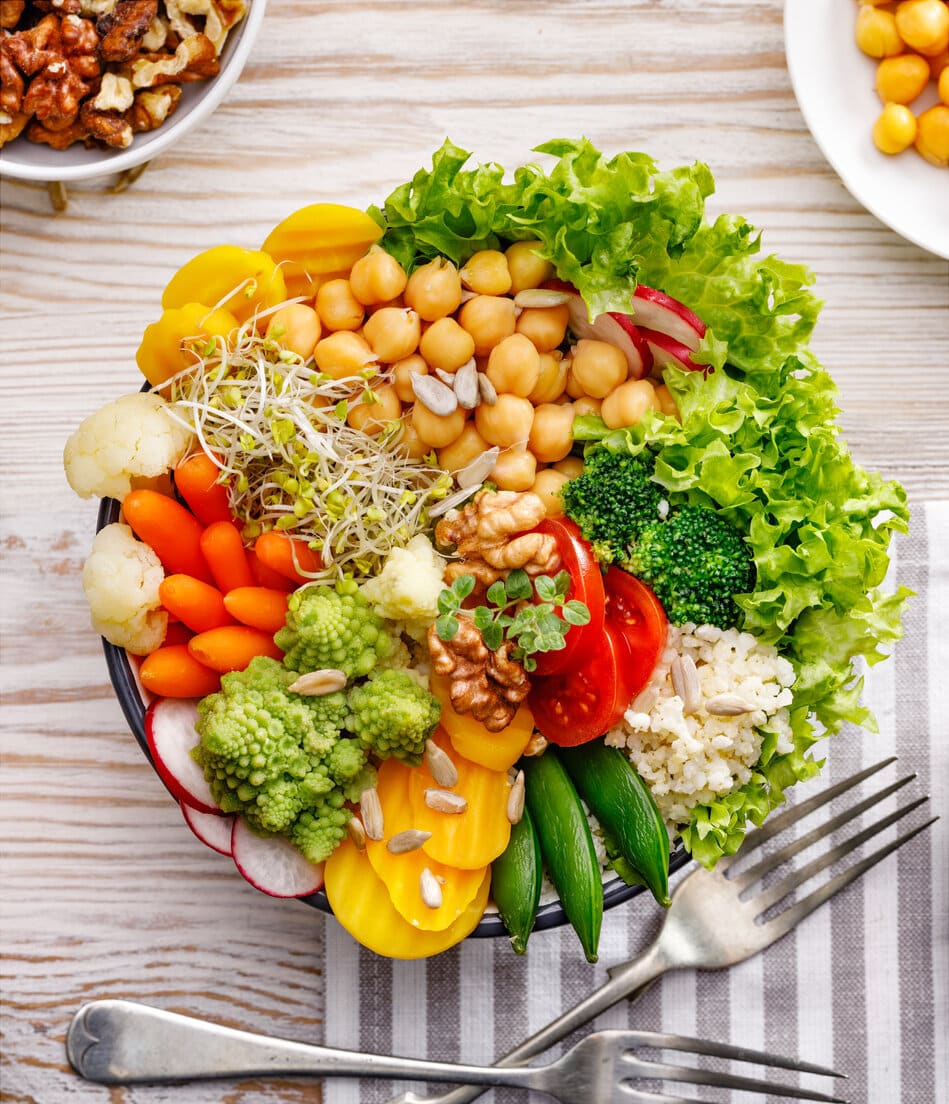Ah…..this question hasn’t quite caused any wars. But close enough.
On one side you have the vegan and vegetarian camp
Saying things like you need a lot less than you think. And you don’t need to eat animals to get your protein needs.
And on the other, you have carnivore people
Saying there really is no need for plant foods, animals can provide sufficient nutrition, and plant foods may even be harmful.

Many people in the bodybuilding world favor high protein intake
Mostly from meat (which also has lots of carnitine, which is necessary for supporting your muscles when you are working out) supplemented with protein powders.
What does the government say? (in their infinite wisdom)
The USDA recommends you get your protein from a broad variety of food including lean meat, low-fat dairy, legumes, nuts, seeds, vegetables, and fruit.
They also recommend consuming .8 grams of protein per kilogram of your weight. (1)
The Academy for Nutrition and Dietetics recommends eating more if you are an athlete or you are doing strength training. (1)
They recommend 1.2 to 1.4 grams of protein per kilogram for athletes and 1.2 to 1.7 grams of protein per kilogram to athletes that do regular strength training. (1)
I recommend that if you are not working out pretty seriously you probably need about .8 to 1 gram of protein per kilogram.
I’ll help with the math.
Let’s say you weigh 135 pounds. You divide that by 2.2 to get your weight in kilograms. So you would be 61.4 kilograms. Then you multiply that number by .8 and that turns out to be 49.
So if you weigh 135 pounds and you are inactive you only need about 49 grams of protein per day.
What if you work out a lot?
If you are doing a lot of strength training you may want to go up to 1.2, 1.5, or even 1.7 grams per kilogram.
So let’s say you weigh 200 pounds and you work out 3 times a week doing some strength training.
Again, divide 200 by 2.2 to get your weight in kilograms. That comes to about 91 kilograms. Multiply that by 1 because you are not working out like crazy so maybe just a small increase over what a sedentary person needs. That means you should aim for 91 grams of protein per day.

If you weigh 91 kilograms (200 pounds) and you are doing serious strength training every day, maybe you need 1.7 grams of protein per kilogram? That would mean you need to eat 185 grams of protein per day.
These are ranges so you have to find what works for you.
If you are not sure how much protein you need, you can experiment. You may think you are getting enough but why not try a month of a higher intake to see if you have more energy and strength?
Of maybe you are trying a keto, paleo, or carnivore diet and you don’t like the way you feel or you don’t really like eating a lot of meat?
Pay attention to your body. It will usually guide you.
One telltale sign of not enough protein is low energy. I have found with my clients that low protein = low energy.
To know if you are getting enough protein, you are looking for the right amount of energy, enjoying the food you eat, and seeing an increase in strength and endurance over time.
What if you are overweight?
With my clients, I recommend they consider their protein needs based on their 6-month target weight.
If someone wants to lose 100 pounds I would ask them how much weight they think they can lose in the next 6 months. If it is 20 pounds (which is realistic) then we would base their protein intake on their body weight 20 pounds lighter than they are now.
Adequate protein intake during weight loss can really help because it is satiating and has fewer calories than fat.
So if someone weighs 200 pounds and they think they’re going to lose 20 pounds in 6 months, we base their protein needs on 180 pounds (82 kilograms). If they are moderately active then we would maybe try out 1 gram of protein per kilogram so they would aim for 82 grams of protein each day.
Is this making sense now?
Is there a difference between men and women?
The research on this is slim and not very definitive. (2)
The differences in protein needs between men and women seem to be based more on muscle mass and fat mass rather than any underlying metabolic differences between the sexes. (2)
The general idea out there in the world is that men need more but there is no definitive research showing that.
I recommend basing it more on your activity level and what you are looking to achieve than on your sex.
If you are looking to build muscle (which really we all are or should be) then I suggest going a little higher with protein.
Vegan? Carnivore? Which is Better?
My long and short answer is that it depends on the person but in general extremely limiting diets are hard to follow and always have the potential for causing nutritional deficiencies in the long run.
I much prefer to encourage people to eat as many foods as they can and to focus on consuming whole foods above any other arbitrary dietary dogma.
How to Eat Enough Protein on a Vegan or Vegetarian Diet
I’m sure most of you are familiar with the vegan diet.
But just in case you are not, a vegan diet avoids all animal products completely. This means avoiding all meat, fish, dairy, eggs, insects, and honey.
By its nature, a vegan diet is lower in protein than a regular diet.
However, I’m sure there are plenty of people eating a vegan diet getting sufficient protein each day.

It needs to be done carefully though.
The sources of protein in a healthy vegan diet would include legumes (peas, lentils, peanuts, chickpeas, beans of all kinds), nuts, seeds, vegetables, fruits, whole grains, and nutritional yeast.
If someone is living on vegan pasta and vegetables they probably won’t be getting enough protein.
Also, keep in mind that proteins are made up of amino acids and animal proteins have a very different make-up of amino acids than plant proteins.
It is possible that a person eating a vegan diet may become deficient in certain types of amino acids.
If you are avoiding all animal products you need to make sure you are getting a variety of legumes and grains so that you get all 9 essential amino acids. Quinoa and buckwheat are two “grains” that contain all 9 of them. But otherwise, you’ll have to combine foods.
Again focusing on whole foods and eating a wide variety of legumes, whole grains, nuts, seeds, and vegetables will most likely bring you to a good amount of protein.
For people that eat a vegan diet, I recommend they have legumes and whole grains at least twice each day and that they aim for a minimum of 12 servings of vegetables a day.
For vegetarians, I recommend at least legumes with whole grains, eggs, or dairy at every meal, and to make sure they eat a lot of vegetables.
For either group protein powders or bars are an option for busy days but should not be relied upon as a continual source of protein.
My concerns are mostly around the fact that these are highly processed foods. Any diet that relies upon processed foods to make them “work” are probably not ideal (same goes for any diet).
